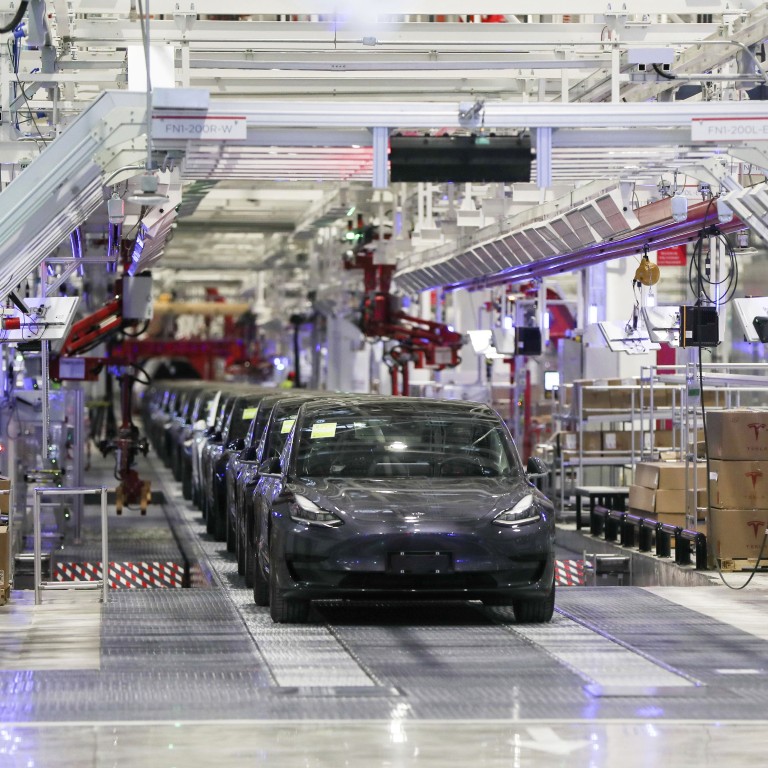
China’s battery makers, car part producers hitch a ride on Tesla’s Shanghai-made electric cars to the top of investor portfolios
- A series of events leading up to the unveiling of Tesla’s Model 3 last week fuelled investors’ interest in Chinese parts suppliers
- That includes the companies that build charging stations, and even the miners of the lithium used in battery packs
Companies engaged in the production of batteries and components for electric vehicles (EVs) are enjoying a bull run in China, as they hitch a ride with the first Tesla electric car to roll off the company’s Shanghai assembly.
A series of events leading up to the unveiling of Tesla’s Model 3 last week fuelled investors’ interest in Chinese parts suppliers, including the companies that build charging stations, and even the miners of the lithium used in battery packs.
“The impact of the localisation of Tesla on China’s EV car part supply chain could be similar to that of Apple on China’s smartphone supply chain,” said Ian Zhu, managing partner at Nio Capital, a technology-focused fund co-founded by Chinese electric vehicle maker Nio. “China will build a strong and competitive ecosystem of EV car part producers. Many Chinese carmakers will benefit from it, as costs decline and technology advances.”
Infographic: Electric vehicles and the Made in China 2025 industrial master plan
Behind Tesla’s speedy progress in China – the Shanghai Gigafactory delivered its first cars less than a year after it broke ground at the start of 2019 – is Beijing’s big push to become a world leader in EV and new-energy vehicles (NEV).
After years of providing heavy subsidies, the government is phasing out incentives to inspire more competition among players. It is also counting on Tesla to lead the race in the world’s largest market for cars and EVs.
EVs will make up 35 per cent of China’s annual car sales by 2030, up from the current 3 per cent, according to forecast by investment research firm Morningstar.
Tesla’s entry into China is also likely to spur new demand for higher-end EVs among Chinese families, as most EVs were bought by corporate such as ride-hailing app operators or taxi firms, according to Ivan Su, automotive equity analyst at Morningstar Investment Management Asia.
“Consumers were unable to find high-end domestic EV providers in the past,” Su said, adding that some buyers will switch from petrol cars to Tesla. “A good-quality brand name will make household users more willing to buy EVs.”
For now, analysts are hopeful that a host of suppliers will benefit directly from Tesla’s expanding production capabilities in Shanghai.
Makers of EV components – including batteries, motor controller, electric engine and charging system – will be able to upgrade their products on higher demand, Guosen Securities’ analysts wrote in a report last week.
They recommended stocks with stable partnerships with carmakers. Among them, Shanghai-listed aluminium part producer Ningbo Xusheng Auto Technology generated 52 per cent of its overall revenue from sales to Tesla, according to an exchange filing last week. Shares of the firm have soared by 42 per cent to 48.34 yuan so far this year.
Guangdong Wencan Die Casting is another company that counts Tesla as a main customer. Revenue from Tesla accounted for 10 per cent of its 2018 income, according to Guosen. Wencan shares have advanced by 27 per cent since a month ago.
Builders and operators of charging stations such as Shenzhen-listed Qingdao Tgood Electric will also see huge opportunities, Sinolink Securities analysts said in a report issued on Tuesday.
But after a spectacular rally over recent week, some have also cautioned that the market’s love affair with Tesla-related stocks could be short-lived as speculative passion fades.
It remains a question whether Tesla itself could keep up with the production plans and become sustainably profitable in the future, according to Su at Morningstar. His firm has an “underweight” recommendation on Tesla’s share. The stock has climbed by 15 per cent so far this year to US$481.09 on Friday, hovering at a historical high.
“We will be more comfortable with Tesla shares when it starts to make money consistently,” Su said.



